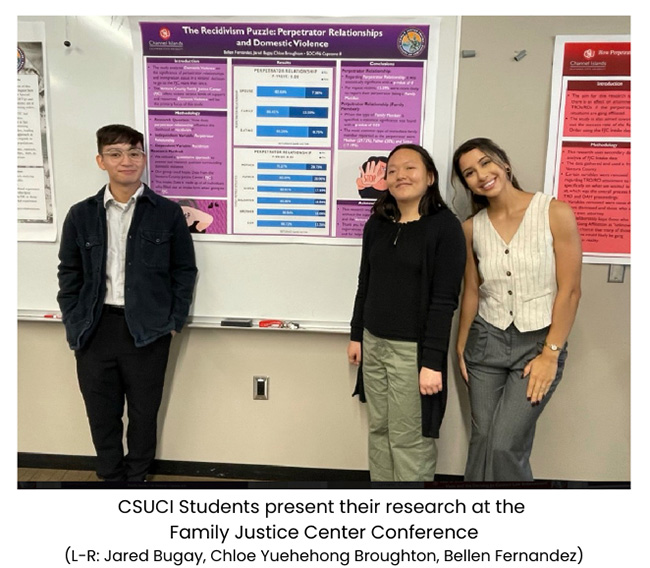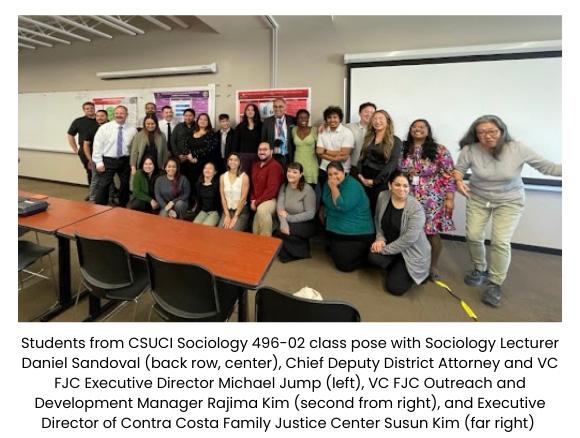 Nov. 25, 2024 - CSU Channel Islands (CSUCI) Sociology Lecturer Daniel Sandoval said
there was “engagement and buzz” over CSUCI Sociology students’ research presentations
at a recent statewide Family Justice Center (FJC) conference in Oxnard.
Nov. 25, 2024 - CSU Channel Islands (CSUCI) Sociology Lecturer Daniel Sandoval said
there was “engagement and buzz” over CSUCI Sociology students’ research presentations
at a recent statewide Family Justice Center (FJC) conference in Oxnard.
The conference was held at the CSUCI Boating Center where 24 CSUCI students in 12 research groups presented posters detailing their findings while answering questions from at least 50 family justice center representatives from around the state.
“Often times, the assignments we give are just that - one and done,” Sandoval said. “But this was something they have worked on for almost a year. To be able to present that work and see people excited about it is really impactful.”
The students’ research projects all dealt with the kinds of cases that come before the Ventura County Family Justice Center, which is an initiative out of the Ventura County District Attorney’s office. Chief Deputy District Attorney Michael Jump, who is in charge of theFJC, had a connection with Sandoval as they were classmates at Santa Paula High School.
“We’ve been collaborating with him to evaluate the Family Justice Center,” Sandoval said. “The purpose of the FJC is to service victims of domestic violence, elder and child abuse, sex trafficking and hate crimes.”
The conference-goers asked the students plenty of questions and left the conference discussing a larger research project based on the findings of the CSUCI students.
“Family Justice Center Directors from all over California were very impressed with the students from Channel Islands and their research,” Jump said. “Our Ventura County Family Justice Center collaboration with CSUCI was the envy of our colleagues and highlighted the potential for a larger statewide research project measuring the cumulative effectiveness of the family justice center’s multi-agency approach across California.”
The students researched a variety of topics that the FJC deals with on a daily basis, usually involving a form of abuse.
 Sociology major Paola Morales researched the barriers that victims of domestic violence
encounter when seeking legal protection, especially when it comes to language proficiency
and having to care for minor children. It was a subject she understood too well.
Sociology major Paola Morales researched the barriers that victims of domestic violence
encounter when seeking legal protection, especially when it comes to language proficiency
and having to care for minor children. It was a subject she understood too well.
“At one point, I went through the process of obtaining a restraining order, and the FJC helped me through my process,” Morales said. “There were times I felt lost and unsure continuing my process but the FJC made me feel supported and I knew I wasn’t alone. This experience inspired me to examine why others might face similar or even greater barriers.”
The conference and research experience inspired her to pursue a master’s degree so she can eventually advocate for domestic abuse survivors.
Sociology majors Rory Yamauchi and Emily Covarrubias were part of a research team who presented their study on elder abuse. Covarrubias, Yamauchi and a third team member, Carlos Aguilar, looked through FJC intake information to identify barriers elder citizens face when seeking temporary restraining orders (TRO)s, and whether there was some barrier that the FJC could address.
“We discovered that whether or not they have a disability, an elderly person will receive a TRO 100% of the time if they complete all of the FJC procedures,” Yamauchi said. “However, there are a lot of instances in which they leave the TRO procedure uncompleted, which may be because of circumstances unrelated to the FJC.”
Both said the experience boosted their confidence in their ability to conduct and present research.
“I didn’t just see numbers on the data set but was able to see them as people who needed help and that I was someone that could possibly do that for them,” Covarrubias said. “This research inspired me to want to go into a career to help others.”
Sandoval plans to continue the collaboration with the FJC in the spring semester, with more emphasis on getting the word out that the FJC is available for victims in need of its services.
“This time, our group is going to be helping the FJC more with outreach,” Sandoval said. “It will be useful for students thinking about going into social work-type jobs as they find ways for an organization like this to get the word out to help people in need.”
